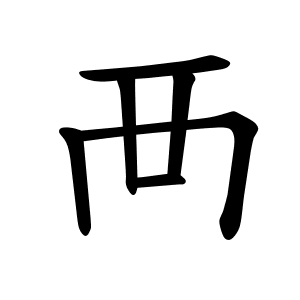襾
- to cover, something that covers an object;
Its origin is an ideograph depicting the shape of something covering from above and below.
Usage in Korean
In the traditional script, the strokes of 覀 are the same or very similar, and characters like 西 (west) and 要 (need) are also classified under this radical.
When used as a radical indicating meaning, it represents concepts related to covering. In this case, the radical is placed at the top (radical head position) of the character.
Occasionally, characters like 𦦉 (meaning "to move, transfer") or 𠧪 (meaning "fruit to ripen") change their form to this radical when appearing at the head position. Sometimes, 鹵 (meaning "salty land, salt marsh") is also replaced by this radical.
Alternative forms
Characters with 襾
6 strokes
9 strokes
襾
덮을
아
deop-eul
a
Kangxi radical:146
Strokes:6
Unicode:U+897E
Cangjie input:
- 一山月 (MUB)
- 難一山月 (XMUB)
Composition:
- ⿱ 一 ⿻ 凵 冂
